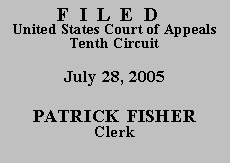

| CEDRIC ALSTON, |
|
| v. | |
| AL ESTEP, Warden, L.C.F., and THE ATTORNEY GENERAL OF THE STATE OF COLORADO, |
Mr. Alston alleges that he was convicted of theft, a class-four felony, following a jury trial in the Denver District Court. In exchange for a plea of guilty to attempted theft, a class-five felony, and three habitual criminal counts, Mr. Alston's conviction was vacated. Mr. Alston now complains that he was thereby denied the opportunity to have a jury determine whether he had been found guilty of three prior felonies for the purposes of enhancing his sentence under Colorado's habitual criminal statute, Colo. Rev. Stat. § 16-13-101, repealed and recodified at Colo. Rev. Stat. § 18-1.3-801, and that the Supreme Court's recent decisions recognize a constitutional right to a jury determination of prior convictions. Mr. Alston also maintains that his lawyer's failure to inform him of this supposed right constitutes ineffective assistance of counsel.
Mr. Alston's application for a COA was filed after the effective date of the Antiterrorism and Effective Death Penalty Act of 1996 (AEDPA), so the provisions of AEDPA govern his appeal. See United States v. Kennedy, 225 F.3d 1187, 1193 (10th Cir. 2000). In order to obtain a COA, an applicant must make "a substantial showing of the denial of a constitutional right." 28 U.S.C. § 2253(c)(2). An applicant may make this showing by demonstrating that "reasonable jurists could debate whether (or, for that matter, agree that) the petition should have been resolved in a different manner or that the issues presented were adequate to deserve encouragement to proceed further." Slack v. McDaniel, 529 U.S. 473, 484 (2000) (internal citation and quotation marks omitted).
Mr. Alston's claim is foreclosed, rather than recognized, by recent Supreme Court precedent. "Any fact (other than a prior conviction) which is necessary to support a sentence exceeding the maximum authorized by the facts established by a plea of guilty or a jury verdict must be admitted by the defendant or proved to a jury beyond a reasonable doubt." United States v. Booker, 125 S. Ct. 738, 756 (2005). This court has already considered and rejected the argument that Booker requires the fact of a prior conviction to be proved to a jury beyond a reasonable doubt before it may be used to enhance a sentence under statutes authorizing longer sentences for recidivists. United States v. Moore, 401 F.3d 1220, 1223 (10th Cir. 2005). The principle that prior convictions are exempted from the rule that facts enhancing a sentence beyond the statutory maximum must be admitted by the defendant or proved to a jury "remains as valid after Booker as it was before. In previous criminal proceedings, a defendant received sufficient procedural protections to alleviate any Sixth Amendment concerns about using convictions stemming from those proceedings for sentencing." Id.
Mr. Alston's claim of ineffective assistance of counsel depends on the validity of his claim to a right to prove his prior convictions to a jury. Since Mr. Alston has no right to have the state prove his prior convictions to a jury, he has no claim for ineffective assistance of counsel.
The district court denied Mr. Alston's motion to proceed on appeal without prepayment of costs, finding that he had failed to show the existence of a reasoned, nonfrivolous argument. See 28 U.S.C. § 1915(a)(3). We review that denial for an abuse of discretion. Denton v. Hernandez, 504 U.S. 25, 33 (1992). An argument is frivolous if "it lacks an arguable basis in either law or fact." Thompson v. Gibson, 289 F.3d 1218, 1222 (10th Cir. 2002). Given that Mr. Alston's sole argument is directly contradicted by the very precedents he cites, we cannot find the district court abused its discretion in denying Mr. Alston's motion to proceed without prepayment of costs.
Petitioner's requests for a COA and to proceed without prepayment of costs are therefore DENIED, and the petition is DISMISSED.
Entered for the Court,
Michael W. McConnell
Circuit Judge